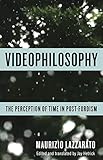Videophilosophy : the perception of time in post-Fordism / Maurizio Lazzarato ; edited and translated by Jay Hetrick.
Material type: TextLanguage: English Original language: Italian Series: Columbia themes in philosophy, social criticism, and the artsPublisher: New York : Columbia University Press, [2019]Copyright date: ©2019Description: 1 online resource (xxv, 276 pages)Content type:
TextLanguage: English Original language: Italian Series: Columbia themes in philosophy, social criticism, and the artsPublisher: New York : Columbia University Press, [2019]Copyright date: ©2019Description: 1 online resource (xxv, 276 pages)Content type: - text
- computer
- online resource
- 9780231540162
- 0231540167
- Videofilosofia. English
- 111/.85 23
- BH301.P64 L3913 2019eb
| Item type | Home library | Collection | Call number | Materials specified | Status | Date due | Barcode | |
|---|---|---|---|---|---|---|---|---|
 Electronic-Books
Electronic-Books
|
OPJGU Sonepat- Campus | E-Books EBSCO | Available |
Includes bibliographical references and index
Lazzarato's political onto-aesthetics / Jay Hetrick -- Introduction -- The war machine of the Kino-Eye and the Kinoki against the spectacle -- Bergson and machines that crystalize time -- Video, flows, and real time -- Bergson and synthetic images -- Nietzsche and technologies of simulation -- The economy of affective forces -- The concept of collective perception -- Afterword : Videophilosophy now : an interview with Maurizio Lazzarato / Jay Hetrick and Maurizio Lazzarato.
The Italian philosopher Maurizio Lazzarato has earned international acclaim for his analysis of contemporary capitalism, in particular his influential concept of immaterial labor and his perceptive writings on debt. In Videophilosophy, he reveals the underpinnings of contemporary subjectivity in the aesthetics and politics of mass media. First written in French and published in Italian and later revised but never published in full, this book discloses the conceptual groundwork of Lazzarato's thought as a whole for a time when his writings have become increasingly influential. Drawing on Bergson, Nietzsche, Benjamin, Deleuze and Guattari, and the film theory and practice of Dziga Vertov, Lazzarato constructs a new philosophy of media that ties political economy to the politics of aesthetics. Through his concept of "machines that crystallize time," he argues that the proliferation of digital technologies over the past half-century marks the transition to a new mode of capitalist production characterized by unprecedented forms of subjection. This new era of the commodification of the self, Lazzarato declares, demands novel types of political action that challenge the commercialization and exploitation of time. This crucial text by an essential contemporary thinker offers vital new perspectives on aesthetics, politics, and media and critical theory
Translated from the Italian.
Print version record.
eBooks on EBSCOhost EBSCO eBook Subscription Academic Collection - Worldwide
There are no comments on this title.

